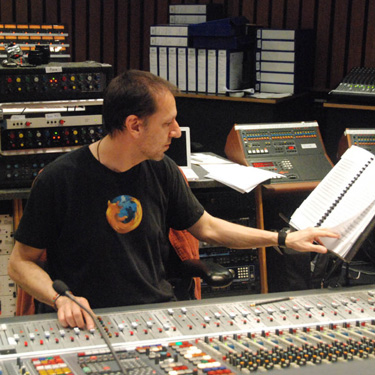|
 Rich Breen Rich Breen
PASADENA, CALIFORNIA: Rich Breen’s quick and early ascension to the upper strata of professional recording a quarter-century ago was not owing to a flashy style or a voguish sound, but rather a well-considered, well-rounded approach to sound recording that was, and continues to be, in equal measures scientific and artistic. He holds a degree in electrical engineering and has studied music, a synergism that has contributed to his roster of clients and recordings that include the Yellowjackets, Charlie Haden, Dianne Reeves, Herbie Hancock, Norah Jones, members of the Rolling Stones, and Ramsey Lewis. Breen has been nominated for the Non-Classical Engineering Grammy, and dozens of his recordings have been nominated or won Grammy Awards in various categories over the years. Last year he won a Latin Grammy for the Ivan Lins/Metropolis Orchestra Recording. In recent years, Breen has become an avid user of the Metric Halo ULN-8 interface, which delivers eight channels of AD/DA conversion, together with eight world-class mic pres, powerful digital processing, and flexible routing.
Breen spends most of his time at his home studio in Southern California, Dogmatic Sound, where the Metric Halo ULN-8 serves as the trusted bridge between the digital world in which he mixes and the analog world that wends its way to his ears. But it’s more than that. “The ULN-8 is like a Swiss Army Knife for audio,” laughed Breen. “In addition to monitoring sends, the outputs feed analyzers and meters, including Metric Halo’s SpectraFoo, which is always up when I mix. But the ULN-8 really shines when I bring it to engagements in studios around town or to record live events.” Breen recently brought the ULN-8 to record legendary keyboardist Lyle Mays perform at one of Caltech’s prestigious TED Events.
Like many projects before it, Breen recorded the latest Yellowjacket’s release (Timelines Spring 2011) at Pasadena’s Firehouse Recording Studios. “I already know going into a session what kinds of mics and processors are available at Firehouse,” said Breen. “I’ve tweaked, for example, the drum inputs using the ULN-8’s ‘Character’ settings. So when I go in now, all I have to do is recall that setting and I’m ready to go. The last several recordings I’ve made at Firehouse have used the ULN-8 on drums, and it’s no coincidence that people are going out of their way to say they are some of the best drum sounds they’ve ever heard!”
Given his background in electrical engineering, Breen has some concrete opinions about what makes the ULN-8 fully professional in every respect. “Like a lot of converters, the ULN-8 sounds great in the predictable, utopian conditions of the recording studio,” he said. “But unlike a lot of converters, it sounds great in the most challenging live situations. Everyone focuses on the same specs: jitter, frequency response, and noise. But those don’t fully capture the performance of gear in the field. Not only are the ULN-8’s converters superb, the support circuitry, including the analog signal paths and the DSP, is top-notch. The performance has always been absolutely bulletproof under fairly rigorous conditions.”
Breen’s reliance on Metric Halo is not limited to the concrete world of hardware. He also uses Metric Halo SpectraFoo sound analysis software whenever he mixes. “I’m sure I under-use its full capabilities, but the tools that I do use are so well implemented that I wouldn’t settle for anything else,” he said. “I always have the stereo spectrum, metering, and phase displays up and running. Sometimes I also look at the power balance and bit meters. The bit meters are particularly well done in SpectraFoo, and extremely useful for spotting problems in the digital signal chain. Like other engineers, I rely on my ears, but these visual tools are useful confirmation if something is amiss, and they do a great job of pinpointing the problem. Moreover, there are low-end and high-end problems that are obvious using SpectraFoo but difficult to hear in many monitoring situations.” |